NOTICES
PENNSYLVANIA PUBLIC UTILITY COMMISSION
Act 13 of 2012—Implementation of Unconventional Gas Well Impact Fee Act; Tentative Implementation Order
[42 Pa.B. 1744]
[Saturday, March 31, 2012]Public Meeting held
March 15, 2012Commissioners Present: Robert F. Powelson, Chairperson; John F. Coleman, Jr., Vice Chairperson; Wayne E. Gardner; James H. Cawley; Pamela A. Witmer
Act 13 of 2012—Implementation of Unconventional Gas Well Impact Fee Act; M-2012-2288561
Tentative Implementation Order By the Commission:
On February 14, 2012, Governor Corbett signed into law Act 13 of 2012, the Unconventional Gas Well Impact Fee Act (Act 13), which amends Title 58 (Oil and Gas) of the Pennsylvania Consolidated Statutes. Act 13 provides, inter alia, for an impact fee, Oil and Gas Act amendments and standards for local ordinances. Act 13 allows counties to pass ordinances to impose an impact fee on unconventional gas well producers and, alternatively, allows municipalities, under certain circumstances, to adopt resolutions compelling the imposition of fees if a county elects not to do so.
The Pennsylvania Public Utility Commission's (Commission) administrative responsibilities for implementing the provisions of Act 13 are contained within Chapters 23 and 33 of the Act. In general, Chapter 23 addresses the determination, collection and disbursement of the impact fees established by Act 13, as well as the method by which counties and municipalities may adopt ordinances and resolutions to qualify for impact fee disbursements. Chapter 33 addresses uniformity of local ordinances, the processes for obtaining advisory reviews of proposed local ordinances and substantive reviews of disputed ordinances, and the ineligibility of a local government for impact fee disbursements if its local ordinance is inconsistent with state law, as provided by Act 13. Accordingly, this Tentative Implementation Order will address those responsibilities and propose procedures to carry out the administrative responsibilities contained in these two chapters.
Chapter 23—Determination, Collection and Disbursement of Impact Fees
Chapter 23 defines the unconventional gas well fee, as well as the Commission's responsibilities for the collection, administration and distribution of fees collected from producers and distributed to qualified counties, municipalities, and other specified recipients. Specific statutory provisions are discussed below.
Section 2302. Unconventional gas well fee.
Impact Fee Notification Procedures and Notice Content
Section 2302 explains the process by which counties may establish impact fee ordinances. Under Section 2302(a), the governing body of a county that has unconventional gas wells1 located within its borders may elect to impose a fee on such wells spud in that county.2 By Monday, April 16, 2012, the governing body of each county may adopt an ordinance to impose an unconventional gas well fee.
The ordinance imposing a fee under subsection (a.1) must be in language that is readily understandable and must include specific language in the following form:
The county of (insert name) hereby imposes an unconventional gas well fee on each unconventional gas well spud in this county.Further, each county governing body electing to implement an impact fee must notify the Commission and give public notice of its intent to adopt an ordinance. See Section 2302(a.1). In order to administer the collection and disbursement of the impact fee, this notice must be provided to the Commission in a timely fashion. Accordingly, counties that adopt impact fee ordinances must provide notice to the Commission, in the form of an official filing directed to the Secretary of the Commission, together with a verified copy of the ordinance, as soon as possible after its adoption but no later than April 23, 2012.3
These official filings must contain the docket number (M-2012-2288561) for this matter (unless a new matter/filing). They may be filed via U.S. mail (first class, certified or overnight delivery4 ); in person5 ; or via the Commission's eFiling system.6 Faxes or filings attached to an email are not acceptable. We recognize that these notification procedures may not become final prior to April 23, 2012. To address this possibility, we note that the above procedures should be used pending the issuance of our Final Implementation Order.
Section 2302(a.3) provides that a county that does not adopt an ordinance imposing an unconventional gas well fee by April 16, 2012 will be prohibited from receiving any funds generated by the fee under this section. This prohibition on the receipt of funds by the county, which extends to its municipalities, will expire and funds may be received for the calendar year following the adoption of an ordinance imposing the fee.
However, Section 2302(a.4) establishes an alternative fee implementation mechanism. If a county's governing body does not impose an unconventional gas well fee under subsection (a.1), the municipalities in that county can compel the imposition of an unconventional gas well fee on every unconventional gas well located in the county if an adequate number of municipalities adopt resolutions to compel the county to impose an impact fee. See Section 2302(a.4)(1).
Specifically, Section 2302(a.4)(2) provides that between April 16 and June 13, 2012,7 if the governing bodies of at least half of the municipalities located in a county or municipalities representing at least 50% of the county's population adopt resolutions to impose unconventional gas well fees on all unconventional gas wells in the county, the fee will take effect. A copy of each municipally adopted resolution must be sent to both the governing body of the county and the Commission.
Municipalities that adopt resolutions and are located in more than one county must transmit a copy of the adopted resolution to the Commission and the governing body of each county in which the municipality is located. See Section 2302(a.4)(2). The population of municipalities located in more than one county will be determined separately for each county based on the municipality's population within each county. Id. at 2302(a.4)(3).
Per Section 2302(a.4)(4), municipal resolutions adopted under this section of Act 13 are required to contain the following language:
The (insert name) in the county of (insert name) hereby resolves to have the county impose an unconventional gas well fee on each unconventional gas well spud in the county.Similar to ordinances adopted by counties, in order to properly administer our duties under the Act, each municipality's notice must be provided to the Commission in a timely fashion. The Commission will tally the municipal resolutions for each county and determine whether either the 50% of municipalities or 50% of a county's population standard has been met to qualify that county for imposition of the impact fee. Accordingly, each municipality that adopts a resolution to impose an unconventional gas well fee must provide notice to the Commission, in the form of an official filing directed to the Secretary of the Commission as described on page 3, together with a verified copy of the resolution, as soon as possible after its adoption but no later than June 20, 2012.
Municipalities located in a county that does not adopt an ordinance imposing an unconventional gas well fee and that do not adopt a resolution under the alternative mechanism by June 13, 2012, will be prohibited from receiving funds under Section 2314(d) of Act 13. Thus, except as provided in Section 2303(a.3), Act 13 does not provide for any subsequent opportunity for municipalities to adopt such resolutions.8
Application of Impact Fee to Wells Spud 2011 or Prior
Section 2302(b) provides that the fee adopted under Section 2302 will be imposed on every producer and will apply to all unconventional gas wells regardless of when those wells were spud. Unconventional gas wells spud before the fee is imposed will be considered to have been spud in the calendar year prior to the imposition of the fee for purposes of determining the amount of the fee. In other words, all unconventional wells spud in calendar year 2011 or before 2011 will be treated as if they were spud in calendar year 2011.
Calculation of Impact Fee
Sections 2302(b)(1)—(b)(6) provide a detailed description of how the impact fee will be calculated based on factors including: when the well was spud, the number of years the well has been subject to the impact fee and the average annual price of natural gas.9 Under Section 2302(b.1), for an unconventional well that begins paying the impact fee and is subsequently capped or is producing less than a stripper well,10 the Commission's initial interpretation is that the unconventional well will pay the impact fee for at least the first three years of production; if the well then qualifies as a stripper well or is capped after the third year of paying the fee, the fee shall be suspended. A vertical gas well,11 however, would only pay a fee (20% of the unconventional well fee) provided that it produces more than a stripper well. See Section 2302(f). Also, for purposes of calculating production from a stripper well, the Commission expects producers to simply divide the well's annual production by the number of days the well is in production in the relevant calendar year.
Section 2302(c) provides for an annual adjustment of the fee to reflect any ''upward changes'' in the Consumer Price Index (CPI) for the Mid-Atlantic Region.
The Commission interprets this section to mean that if there is no upward change in the CPI, no CPI adjustment will be made to the impact fee.12 In addition, this subsection provides that the annual CPI adjustment will take effect only if ''the total number of unconventional gas wells spud in the adjustment year exceeds the total number of unconventional wells spud in the prior year.'' In other words, the CPI adjustment to the impact fee will be applicable only if the industry is growing.
Section 2302(d) provides for impact fee assessment procedures for re-stimulated unconventional wells. Section 2302(e) provides that payments of the fee will cease upon certification to the Pennsylvania Department of Environmental Protection (DEP) by the producer that the unconventional gas well has ceased production and has been plugged according to DEP regulations.
Section 2303. Administration.
Fee Collection Timing and Procedures
Section 2303(a)(1) establishes the due date for payment of the fee imposed under this chapter for wells spud after January 1, 2012 to be April 1, 2013 and each April 1 thereafter. For wells spud before January 1, 2012, initial fees imposed under this chapter are due by September 1, 2012.
Section 2303(b) requires each producer to submit payment of the fee and a report of such payment to the Commission by September 1, 2012 and each April 1 thereafter.13 The report to the Commission must include the following information: (1) the number of that producer's spud unconventional gas wells in each municipality within each county that has imposed a fee; and (2) the date that each unconventional gas well was spud or ceased production of gas. In order to fulfill this requirement and track information necessary to administer the Act, the Commission has developed a draft of a Producer Report form, which is labeled as Attachment ''A'' to this Tentative Implementation Order outlining the information to be contained in the annual report to the Commission. Comments to improve the draft report are welcome.
Administrative Charges
Section 2303(c)(1) authorizes the Commission to impose an annual administrative charge of not more than $50 per spud unconventional gas well to cover the costs incurred to administer and enforce the requirements of Act 13. Sections 2303(c)(2) and (c)(3) generally establish procedures for the Commission to estimate its annual expenditures directly attributable to administration and enforcement of this chapter, after subtracting any funds received from the $50 per well fee and Section 2314(c.1) amounts received by the Commission, and allows the Commission to assess any remaining balance on all producers in proportion to the number of wells owned by each producer. Payment of the assessment is due within 30 days of receipt of the invoice.
Further, by June 30, 2012, and each June 30 thereafter, the Commission must estimate its expenditures attributable to the administration and enforcement of Act 13. The Commission has established time codes within the agency to track employee hours and costs associated with the administration of Act 13, and will use that data to develop a fair, accurate and transparent assessment process. Finally, if any disputes are raised regarding the calculated assessment amounts, Act 13 provides that producers may challenge these amounts under the procedures set forth in Section 510 of the Public Utility Code, 66 Pa.C.S. § 510.14
Section 2304. Well information.
Section 2304 requires the DEP, by February 28, 2012, to provide the Commission and, upon request, a county, with a list of all spud unconventional gas wells. Further, the DEP must update the list and provide it on a monthly basis to the Commission. The Commission has already received this well information from the DEP and it is under review for integration into the Commission's impact fee determination, collection and disbursement processes under the Act.15
Additional requirements are placed on producers to self-report and update the Commission regarding: (1) the spudding of additional wells; (2) the initiation of production at an unconventional well; and (3) the removal of an unconventional gas well from production.16 Lastly, we note here that if a producer or local government determines that the well information provided by the DEP to the Commission is incomplete or otherwise inaccurate, the producer should address that concern with the DEP.
Section 2305. Duties of department.
Section 2305(a) requires the DEP to confirm that, prior to issuance of a permit, all fees owed for an existing unconventional gas well have been paid. Section 2305(b) prohibits the DEP from issuing a permit to a producer to drill an unconventional gas well until all fees owed have been paid. Section 2305(c) requires the Commission to provide the DEP with the information necessary to determine that a producer has paid gas well fees owed for all unconventional gas wells under Section 2302.
Section 2307. Commission.
Section 2308. Enforcement.
Section 2309. Enforcement orders.
Section 2310. Administrative penalties.
Sections 2307 through 2310 are related and we address them collectively. Section 2307 authorizes the Commission to make all inquiries and determinations necessary to calculate and collect impact fees, administrative charges and assessments to be paid by producers, including interest and penalties. Section 2308 authorizes the Commission to assess interest, penalties, and deficiency notices on producers, and also make available equitable remedies including liens and execution of judgments in state civil court for non-payment.17 Section 2309 allows the Commission to issue enforcement orders. Section 2310 authorizes the Commission to assess civil penalties for violations of this chapter.18
The Commission expects that producers will cooperate by responding timely to any inquiry necessary to calculate and collect the impact fees imposed under Act 13. At the same time, and consistent with basic due process, the Commission intends to provide producers with notice and an opportunity to be heard before any final enforcement order or measure is rendered. The Commission will issue additional orders and/or Secretarial Letters as needed to inform interested parties of any future developments regarding these investigation and enforcement processes.
Section 2312. Recordkeeping.
Section 2313. Examinations.
Section 2312 establishes record-keeping requirements on producers, and authorizes the Commission to require producers to make reports, render statements or keep records as deemed necessary to determine liability for the impact fee. Section 2313 authorizes the Commission to access, review and audit records maintained by producers and requires producers to maintain records for at least three years. Section 2313 also provides certain confidential protections for information obtained from producers.
Section 2314. Distribution of fee.
Section 2314(a) establishes a fund in the State Treasury known as the ''Unconventional Gas Well Fund'' that will be administered by the Commission. Section 2314(b) requires that all fees imposed and collected under Chapter 23 must be deposited into this fund. Section 2314(c) provides a detailed allocation procedure for the distribution of collected funds to various recipients including conservation districts, state agencies and to the ''Marcellus Legacy Fund.''19 See Sections 2314(c), (c.1), (c.2).
Fee Distribution to Localities
Section 2314(d) provides that for the year 2011 and each year thereafter, 60% of the funds remaining in the Unconventional Gas Well Fund, after specified distributions, will be allocated to counties and municipalities for those purposes specifically authorized in Section 2314(g). The legislation also specifies, at Sections 2314(d)(1), (2) and (3), that the remaining amount will be allocated to counties and municipalities by a formula whose denominator is ''the number of spud unconventional gas wells in this Commonwealth.'' See id. at §§ 2314(d)(1), (d)(2), (d)(3). The intention of the legislation is to distribute this entire 60% amount to the entities described in these three subsections. At the same time, all spud wells may not be subject to the impact fee under Act 13 if a county declines to participate. Accordingly, for purposes of calculating the disbursement, the Commission will interpret these subsections as referring to the total number of spud unconventional wells subject to the impact fee under Act 13.
Also, 40% of the remaining funds of the Unconventional Gas Well Fund, following specific distributions, will be deposited in the Marcellus Legacy Fund, appropriated to the Commission and distributed to various recipients pursuant to Section 2315. The Commission is presently developing the algorithms and computer programs necessary to distribute the Unconventional Gas Well Funds in accordance with this statutory formula.
In addition, because Section 2314(e) provides that the amount allocated to each municipality shall not exceed the greater of $500,000 or 50% of the total budget for the prior fiscal year beginning with the 2010 budget year, the Commission needs budget information regarding each municipality that qualifies for impact fee disbursements under Subsection (d). Accordingly, in order to administer the distributions in accordance with the statutory formula for impact fee disbursement to local governments, the Commission has developed a draft Municipality Budget Report form for the use of municipalities, located at Attachment ''C'' to this Tentative Implementation Order. Comments to improve the draft budget report are welcome.
Reporting
Section 2314(h)(1) establishes a requirement on the Commission to submit an annual report to the Senate and House of Representatives Appropriations Committees and Environmental Resources and Energy Committees by December 30, 2012 and by September 30 of each year thereafter. The initial report must include a detailed listing of all deposits to and expenditures from the fund.
Section 2314(h)(2) requires that all counties and municipalities receiving funds submit information to the Commission on a Commission prepared form that sets forth the amount and use of funds received in the prior year. Specifically, the form will document that the funds received were committed to a specific project or used as authorized in Chapter 23 of the Act. Further, Section 2314(h)(2) requires that these reports must be published annually on the county or municipality's publicly accessible website. In order to comply with the requirements of this Section, the Commission has developed a draft Impact Fee Disbursements Report form for use of counties and municipalities, marked as Attachment ''D'' to this Tentative Implementation Order. Comments to improve the draft disbursements report are welcome.
Section 2315. Statewide initiatives.
Section 2315 establishes a State Treasury fund known as the Marcellus Legacy Fund and provides detailed requirements for the distribution of the proceeds of that Fund. As noted, this Legacy Fund receives 40% of the impact fee monies remaining in the Unconventional Gas Well Fund, after specific distributions. The Commission is presently developing the algorithms and computer coding necessary to distribute the Marcellus Legacy Funds in accordance with this statutory formula.
Chapter 33. Local Ordinances Relating to Oil and Gas Operations.
Chapter 33 governs the enactment by local governments of local ordinances that impose conditions, requirements or limitations on those aspects of oil and gas operations regulated by Chapter 32 (relating to development of oil and gas operations).20 More specifically, Chapter 33 preempts and supersedes the local regulation of oil and gas operations that are inconsistent with Act 13 standards. Accordingly, no local ordinances adopted pursuant to the Municipalities Planning Code (MPC), 53 P. S. § 10101 et seq., or the Flood Plain Management Act (FPMA), 32 P. S. § 679.101 et seq., can contain provisions that impose conditions, requirements or limitations on the same features of oil and gas operations regulated by Chapter 32 or that accomplish the same purposes as set forth in Chapter 32.
In addition, Chapter 33 provides processes for obtaining advisory opinions from the Commission of proposed local ordinances regarding oil and gas operations, substantive reviews of disputed ordinances and appeals, and the ineligibility of a local government for impact fee disbursement if its local ordinance is inconsistent with state law, as provided by Act 13.
Section 3301. Definitions.
A number of terms are defined within Chapter 33. Of particular significance is the definition of ''oil and gas operations'' which is defined as follows:
The term includes the following:(1) well location assessment, including seismic operations, well site preparation, construction, drilling, hydraulic fracturing and site restoration associated with an oil or gas well of any depth; (2) water and other fluid storage or impoundment areas used exclusively for oil and gas operations; (3) construction, installation, use, maintenance and repair of: (i) oil and gas pipelines; (ii) natural gas compressor stations; and (iii) natural gas processing plants or facilities; and (4) construction, installation, use, maintenance and repair of all equipment directly associated with activities specified in paragraphs (1), (2), and (3), to the extent that the equipment is necessarily located at or immediately adjacent to a well site, impoundment area, oil and gas pipeline, natural gas compressor station or natural gas processing plant; and the activities are authorized and permitted under the authority of a Federal or Commonwealth agency.For purposes of application of the provisions of Chapter 33, the Commission will be required to interpret local government ordinances that purport to regulate ''oil and gas operations'' pursuant to the above definition.
Section 3302. Oil and gas operations regulated pursuant to Chapter 32.
Section 3302 preempts all local ordinances purporting to regulate ''oil and gas operations'' except with respect to local ordinances adopted pursuant to the MPC and the FPMA. In addition, no local ordinance adopted pursuant to the MPC or the FPMA may impose conditions, requirements or limitations over the same aspects of oil and gas operations now regulated by Chapter 32.
Section 3303. Oil and gas operations regulated by environmental acts.
Section 3303 further preempts and supersedes local ordinances that are inconsistent with existing state or federal environmental statutes regulating environmental aspects of oil and gas operations. However, because the environmental regulation of oil and gas operations are exclusively regulated by the DEP under environmental acts, the Commission will render no determinations in this area.
Section 3304. Uniformity of local ordinances.
Section 3304 provides that all local ordinances addressing development of oil and gas operations ''must allow for the reasonable development of oil and gas resources'' based on the standards set forth in Sections 3304(b)(1) through (b)(10). These provisions, as well as standards established in Chapter 32, provide the guidelines against which the Commission will evaluate local government ordinances presented to it for issuance of either an advisory opinion or request for review as described in Section 3305.
Section 3305. Commission.
Commission Procedures for Ordinance Review
Section 3305 establishes the scope of Commission review regarding local government ordinances presented to it for evaluation. Two procedures are contemplated under this provision, depending on which entity seeks review. Of note, these procedures are applicable pending the issuance of our final Implementation Order.
Advisory Opinions
Where a municipality requests a review of a local ordinance prior to its enactment, Section 3305(a) provides that the Commission shall issue ''advisory opinions'' to municipalities regarding whether proposed ordinances violate the MPC, Chapter 32 (relating to development of oil and gas resources) or Chapter 33 (relating to local ordinances affecting oil and gas operations). These opinions are advisory in nature, and are not appealable. See Section 3305(3).
Municipal requests for advisory opinions regarding proposed local ordinances must be officially filed with the Commission's Secretary's Bureau as described on page 3. Requests need to include a complete copy of the proposed ordinance for which advice is requested, as well as an identification of the specific section of the ordinance that is in potential conflict with Chapter 32 and/or 33 of Act 13or the MPC. The Commission must issue an advisory opinion within 120 days of the filing. Section 3305(2).
In order to assist municipalities with these requirements, the Commission has developed a draft Request for Advisory Opinion Form for counties and municipalities at Attachment ''E'' to this Tentative Implementation Order. Comments to improve the draft Request for Advisory Opinion Form are welcome. Although not required by statute, the Commission will also accept, as resources permit, requests for advisory opinions regarding previously enacted local ordinances.
Requests for Review
Section 3305(b) allows owners or operators of an oil or gas operation or a person living within the geographic boundaries of a local government, aggrieved by enactment or enforcement of a local ordinance, to request that the Commission review the ordinance in question to determine whether the local ordinance violates the MPC, Chapter 32 and/or Chapter 33 of Act 13. The Commission must issue an Order within 120 days of receipt of the request. Participation in the Commission review under this provision will be limited to the owner or operator of the gas well, the resident who brings the action and the local government.
Requests for review of a local ordinance under Section 3305(b) shall be filed with the Commission Secretary's Bureau. The request for review must include the following: (1) the exact name and address of the local government whose ordinance is to be reviewed, (2) a complete copy of the ordinance for which review is requested, and (3) an identification of the section of the ordinance or issue with the ordinance that is in potential conflict with Chapters 32, 33 or the MPC. The Commission will serve a copy of the request for review and a notice to respond on the local government that enacted the ordinance.
The local government served with the request for review will have 20 days from the date of service to file, with the Secretary of the Commission, an answer to the request for review. See 52 Pa. Code § 1.11 (date of filing) and § 1.56 (date of service). Requests for review and answers may be filed by mail, in person, or electronically consistent with the Commission's rules of practice and procedure found at 52 Pa. Code §§ 1.1—1.59.
The Commission has developed a draft Request for Review Form for use by owners or operators of an oil or gas operation or a person residing in the local government's geographic boundaries at Attachment ''F'' of this Tentative Implementation Order. Comments to improve the draft request for review form are welcome.
The Commission anticipates that, absent unusual circumstances, requests for review will involve issues regarding potential inconsistencies between the local ordinance and the requirements of Chapters 32, 33 and the MPC and, accordingly, will not require an oral hearing to resolve contested material facts. However, the Commission reserves the right, in its sole discretion, to refer a matter involving any disputed issues of fact to the Office of Administrative Law Judges (OALJ) for an expedited hearing and the development of a record. The hearing, if held, will be convened in person or, if appropriate, telephonically. The record will then be certified to the Commission so that it may complete its review within 120 days.
As indicated above, the Commission must issue an order regarding the request for review within 120 days of the filing. In order to allow the Commission to meet this 120 day deadline, Act 13 has exempted the Commission from the requirements of the Sunshine Act, which would otherwise require the Commission's votes to be cast at a public meeting. Nevertheless, this will be a public and transparent process. All requests for review and answers thereto will be public documents, available on the Commission's website. Moreover, each Commissioner's vote will be noted on the face of the order and each order, including any statements and dissenting opinions, will be public documents posted to the Commission's website.
Lastly, while the ex parte prohibitions in Public Utility Code do not apply, the Commission will nevertheless continue to abide and require the parties to abide by the ex parte prohibitions set forth in Section 334. The requests for review under Act 13 are contested proceedings and, accordingly, basic principles of due process require that no party should have the ability to hold off the record communications with the Commission regarding the merits of the contested matter.
An order issued by the Commission in response to a request for review is subject to de novo review by the Commonwealth Court. This allows the court to review the entire matter and to supplement the Commission record as needed.
Section 3305(d) provides the Commission with additional authority to employ persons, issue orders and promulgate temporary and permanent regulations to implement provisions of the legislation. The Commission anticipates that it will acquire additional resources to assist the Commission in handling advisory opinions and requests for review under this section.
Section 3306. Civil actions.
Section 3306 authorizes anyone aggrieved by the enactment or enforcement of a local ordinance to bypass Commission review and, instead, file a civil action directly with Commonwealth Court in order to attempt to invalidate an ordinance that violates the MPC, Chapter 32 or Chapter 33 of this legislation. An aggrieved party may elect to proceed under this Section without seeking review of an ordinance before the Commission. See section 3306(2). However, there is no statutory deadline for action by the Commonwealth Court.
Section 3307. Attorney fees and costs.
Section 3307 allows for recovery of reasonable costs and fees from a local government by a plaintiff if that party successfully prevails over the local government and establishes that the local ordinance was enacted with willful or reckless disregard of the law. Similarly, if the action is deemed ''frivolous or was brought without substantial justification,'' the Commonwealth Court (not the Commission) may order the plaintiff to pay reasonable attorney fees and other reasonable costs incurred by the local government in defending the civil action. This provision applies only to civil matters originating in Commonwealth Court under Section 3306(1) and not to matters adjudicated before the Commission.
Section 3308. Ineligibility.
Section 3308 provides that if the Commission or Court issues an order that a local ordinance violates the MPC, Chapter 32 or Chapter 33 of Act 13, the local government will be ''immediately ineligible'' to receive any impact fee funds. The local government shall remain ineligible until it amends or repeals its ordinance or a determination that the local ordinance is unlawful is reversed on appeal.
In the event that the Commission determines, in the context of a request for review, that the local ordinance is inconsistent with Chapter 32, 33 or the MPC, the local government may elect to amend or repeal the ordinance to remove the inconsistency. The amendment or repeal of the inconsistent ordinance should be filed with the Commission within five (5) business days of the local government's action. If, upon review by the Commission, the inconsistency is determined to have been cured, the Commission will so notify the local government by subsequent order or Secretarial Letter and restore the local government to the list of municipalities eligible to receive funds under Chapter 23.
Section 3309. Applicability.
Section 3309(a) provides that this chapter shall apply to the enforcement of all local ordinances existing on the effective date of this chapter and to the enactment and enforcement of a local ordinance enacted on or after the effective date of this chapter.
The legislation also provides, at Section 3309(b), that local governments will have 120 days from the effective date of this chapter, April 14, 2012, to review and amend an existing ordinance to comply with Act 13. Because the ability of persons aggrieved by the enactment or enforcement of a local ordinance to file a request for review under Section 3305(b) also commences on April 14, 2012, the Commission advises local governments that intend to revise their ordinances to comply with the act to do so in advance of the 120 day deadline or by Monday, August 13, 2012. This avoids the potential for issuance of a Commission order triggering ineligibility under Section 3308.
Conclusion
The Unconventional Gas Well Impact Fee Act (Act 13) establishes an impact fee for unconventional wells that will be administered by the Commission and, further, establishes a uniformity of local ordinances standard regarding oil and gas operations that will be subject to review by the Commission and de novo review by the Commonwealth Court. The Commission has issued this Tentative Implementation Order in order to outline the key portions of the act that this agency is required to administer and to provide our tentative views on how those provisions will be implemented. At this junction, our order will be issued for public comment and, upon review of those comments and further meetings with stakeholders as appropriate, the Commission will issue a final implementation order to set forth its interpretations and processes.
Finally, in addition to this Implementation Order process, we will continue to respond to informal inquiries made to the Commission's resource account at ra-Act13@pa.gov, update frequently asked questions (FAQs) as appropriate and, as needed, issue Secretarial Letters to provide guidance on further issues that may arise regarding the implementation of Act 13. Requests for advisory opinions or requests for reviews related to local ordinances should not be emailed to the Commission at the ra-Act13@pa.gov email account. Those requests must be officially filed with the Secretary of the Commission as described on page 3.
In the meantime, work to implement Act 13 will continue. The Commission will be developing the processes to determine, collect and distribute the impact fee funds, and the Commission will provide advisory opinions regarding proposed local ordinances. The Commission also recognizes that it is addressing a new set of issues with stakeholders that are unfamiliar with our processes. In an effort to familiarize these parties with our procedures, we have informally met with stakeholders, producers and local governments, and will continue to do so, as needed, to ensure that we understand their concerns, and that we implement Act 13 in a manner that is fair, transparent and consistent with its legislative intent. While this order addresses the key issues necessary for implementation of Act 13, we recognize that there are other issues not presently addressed or that may arise and require resolution in the future. Accordingly, if there are additional issues that should be addressed, commenters may, by April 30, 2012, identify these issues and propose resolutions for our consideration and disposition in a Supplemental Implementation Order. Therefore,
It Is Ordered That:
1. Upon issuance of a Final Implementation Order in this matter, each producer with unconventional wells spud in this Commonwealth shall submit payment of the impact fee imposed under Chapter 23, for each county that has imposed an impact fee, to the Unconventional Gas Well Fund by September 1, 2012 and by April 1 of each year thereafter, and shall file a Producer Report with the Commission regarding such payments using the form set forth in Attachment A of this Order by those same dates.
2. Each producer shall file a Producer Well Update Report with the Commission by September 1, 2012 and each April 1 thereafter, using the form set forth in Attachment B of this Order.
3. Each municipality qualified to receive disbursements from the impact fee imposed under Chapter 23 shall file a Municipality Budget Report with the Commission by July 6, 2012 using the form set forth in Attachment C of this Order.
4. Each county and municipality receiving disbursements from the impact fee imposed under Chapter 23 shall file an Impact Fee Disbursements Report with the Commission by April 15 of each year, using the form set forth in Attachment D of this Order.
5. The draft Advisory Opinion and Requests for Review forms in Attachments E and F shall be used for any such requests filed on and after the entry date of this order pending any changes to these forms that may be directed as a result of our final implementation order.
6. Any interested party may submit comments regarding this Tentative Implementation Order within twenty (20) days of entry of this Order.
7. Any interested party may, by April 30, 2012, propose issues beyond those addressed in this order that warrant our consideration and disposition in a supplemental implementation order.
8. A copy of this Tentative Order shall be published in the Pennsylvania Bulletin and posted on the Commission's website at www.puc.state.pa.us click on Natural Gas/Act 13 (Impact Fee).
9. A copy of this Tentative Order be served on the following organizations: County Commissioners Association of Pennsylvania, Pennsylvania State Association of Boroughs, Pennsylvania Association of State Township Supervisors and the Pennsylvania League of Cities and Municipalities.
ROSEMARY CHIAVETTA,
Secretary
ATTACHMENT A
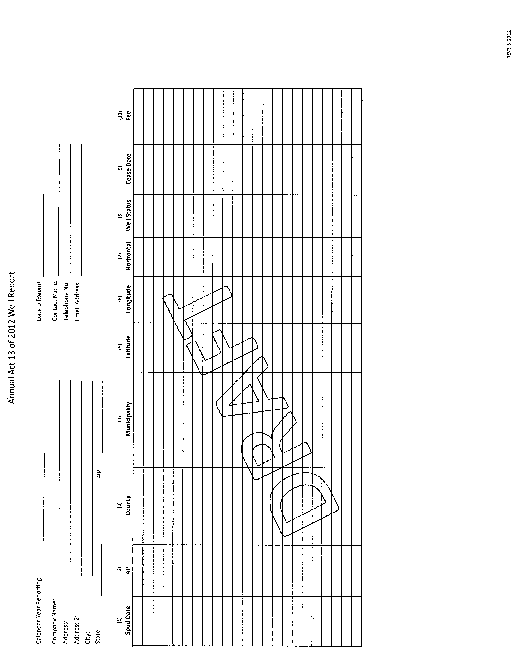
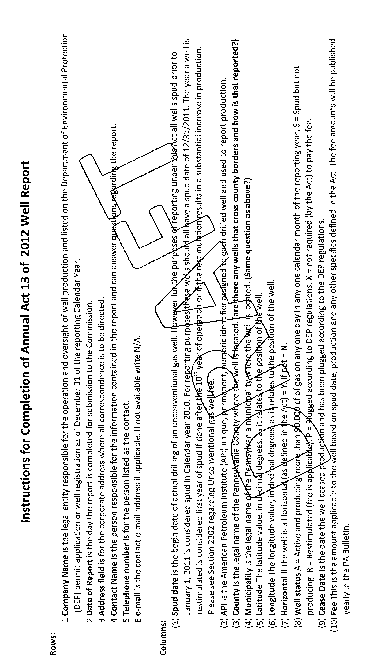
ATTACHMENT B
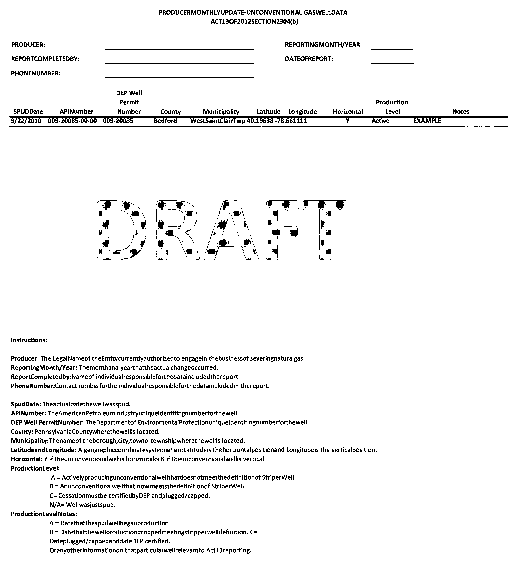
ATTACHMENT C
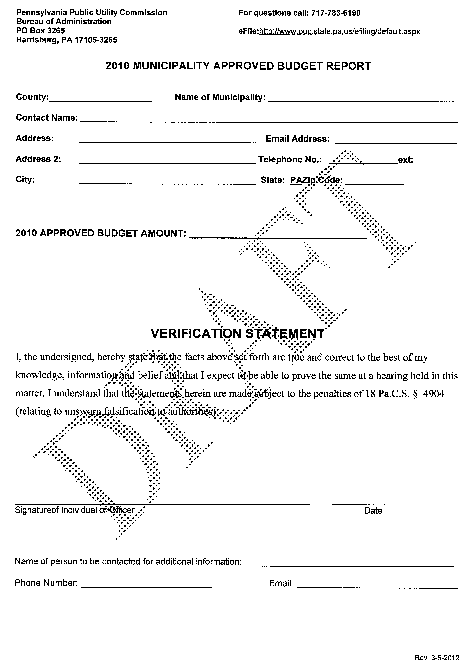
ATTACHMENT D
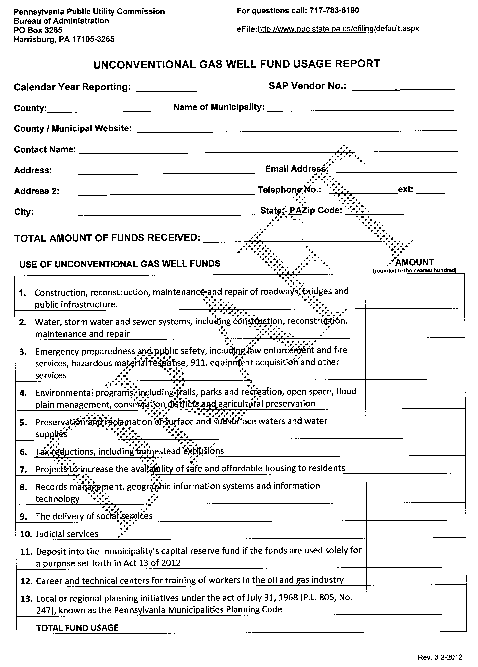
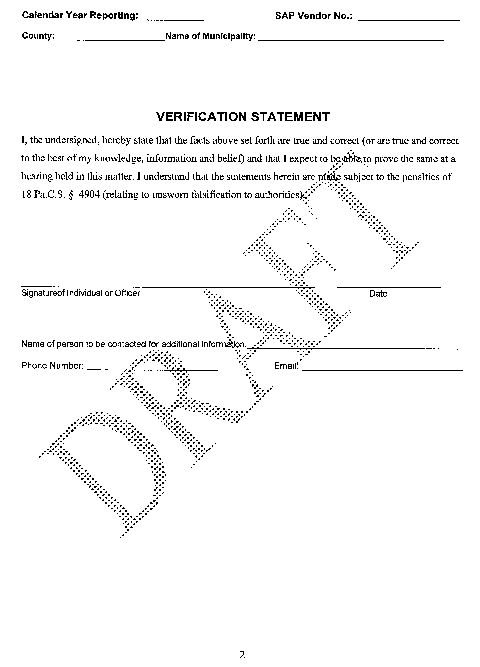
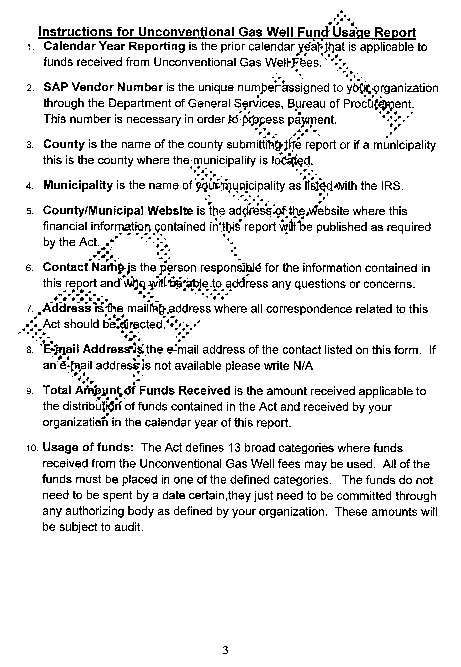
ATTACHMENT E
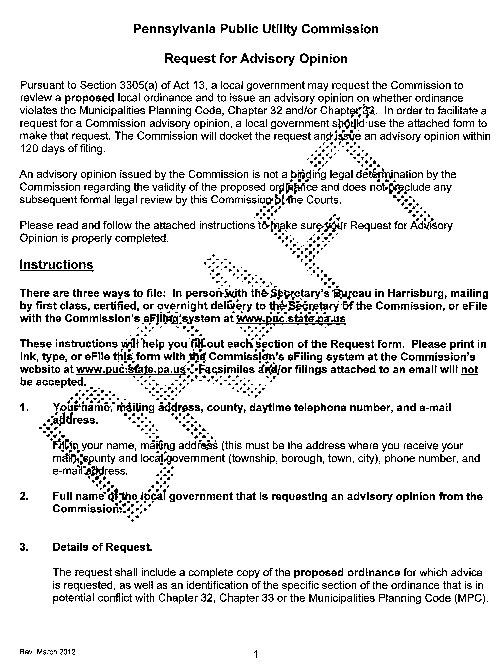
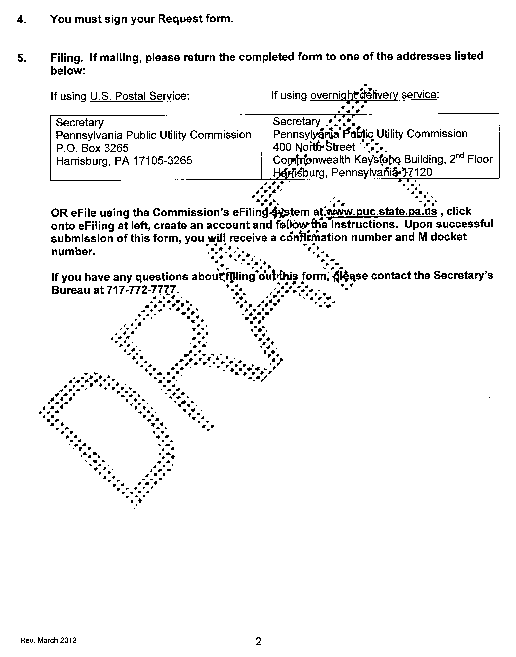
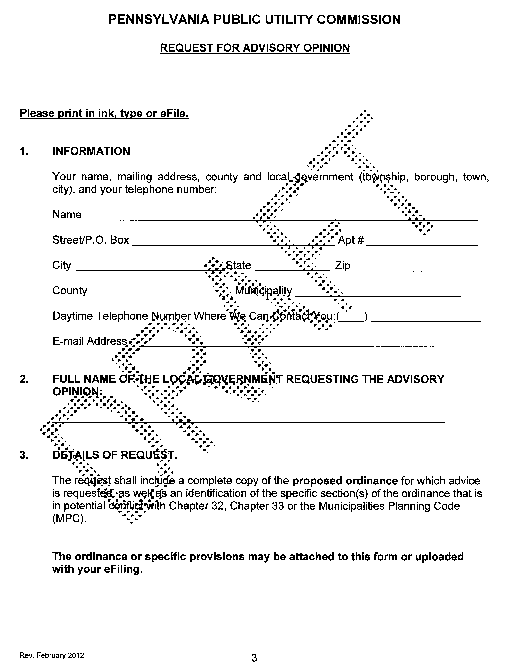
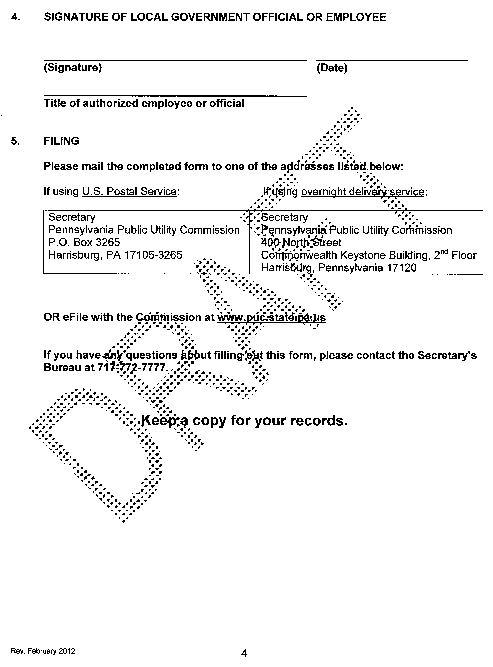
ATTACHMENT F
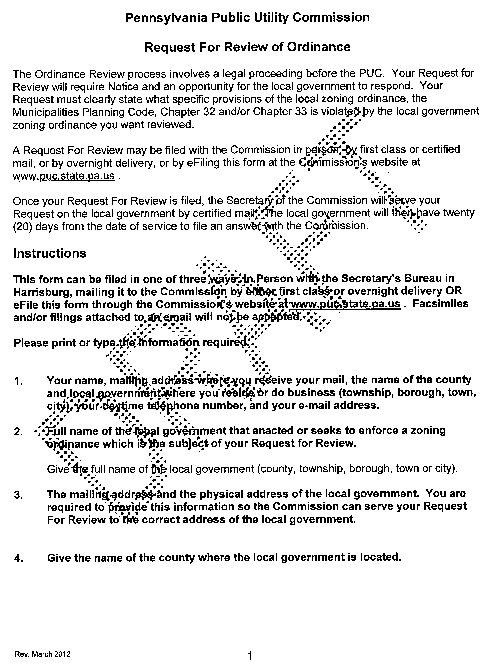
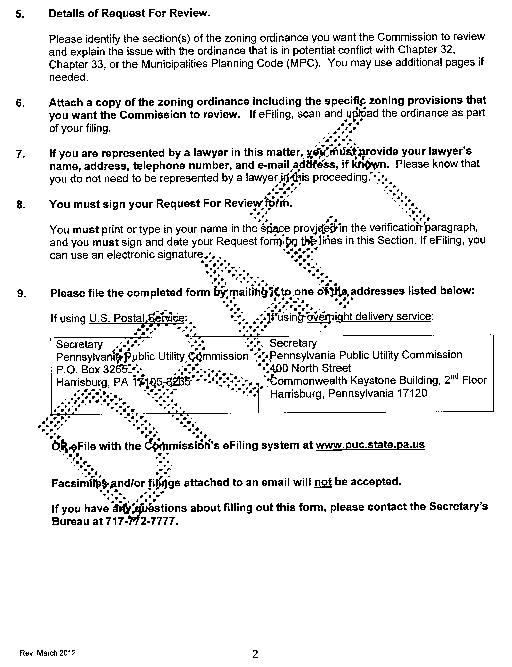
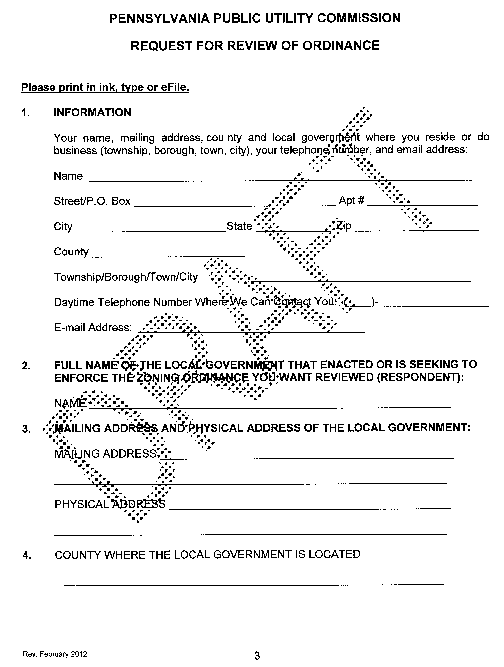
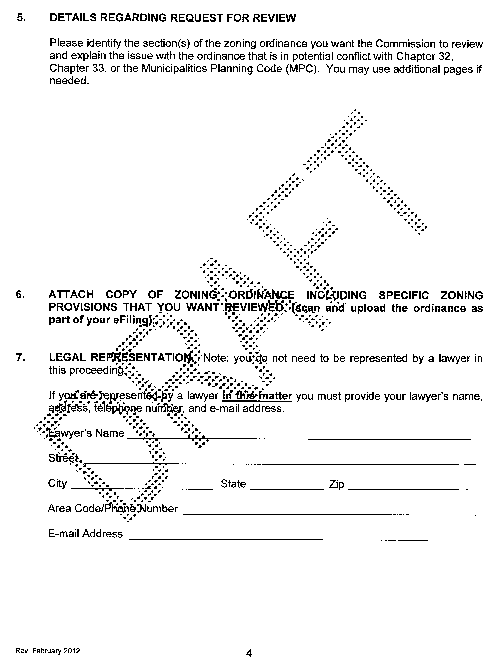
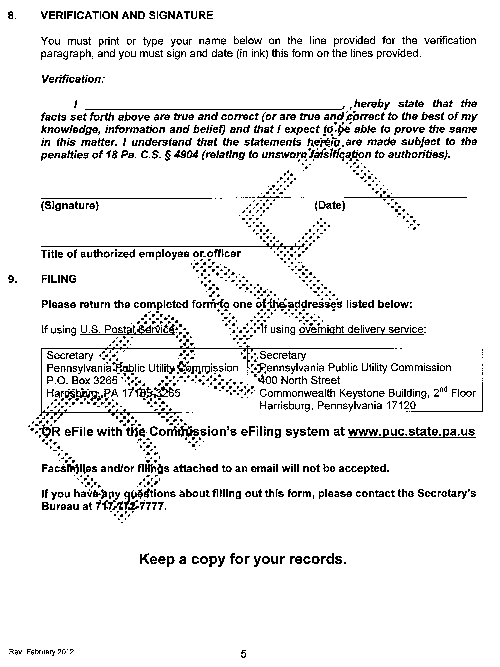
[Pa.B. Doc. No. 12-595. Filed for public inspection March 31, 2012, 9:00 a.m.] _______
1 ''Unconventional gas well'' is defined as ''a bore hole drilled or being drilled for the purpose of or to be used for the production of natural gas from an unconventional formation.'' 58 Pa.C.S. § 2301. ''Unconventional formation'' is defined as ''a geological shale formation existing below the base of the Elk Sandstone or its geologic equivalent stratigraphic interval where natural gas generally cannot be produced at economic flow rates or in economic volumes except by vertical or horizontal well bores stimulated by hydraulic fracture treatments or by using multi-lateral well bores or other techniques to expose more of the formation of the wellbore.'' Id.
2 ''Spud'' is defined as ''the actual start of drilling on an unconventional gas well.'' Id.
3 The County Commissioners Association of Pennsylvania has developed a standardized form that the Commission has determined fulfills this requirement. That form is available at www.pacounties.org. Click on ''Shale Gas/Act 13 Analysis and resources,'' then under ''Attachments,'' click on ''Model County Ordinance.''
4 Date of deposit or postmark or shipping date by first class mail, certified or overnight delivery must be the same date the filing is due.
5 In person filings may be made between 8 a.m. and 4:30 p.m. Monday through Friday on the date due at the Commission's offices at 400 North St., Harrisburg, in the Secretary's Bureau Filing Room, located on the Second Floor.
6 Information on eFiling is located at www.puc.state.pa.us, Click on ''eFiling'' on the left. A tutorial for eFiling can be found at http://www.puc.state.pa.us/naturalgas/naturalgas_marcellus_Shale.aspx.
7 June 13, 2012 is 120 days from February 14, 2012, the effective date of Chapter 23.
8 Alternatively, Act 13 does permit counties to receive funds in subsequent years upon adoption of an ordinance imposing the impact fee even if the county failed to adopt such an ordinance previously. See 58 Pa.C.S. § 2302(a.3)(2).
9 ''Average annual price of natural gas'' is defined as ''the arithmetic mean of the New York Mercantile Exchange (NYMEX) settled price for the near-month contract, as reported by the Wall Street Journal for the last trading day of each month of a calendar year for the 12-month period ending December 31.'' 58 Pa.C.S. § 2301.
10 ''Stripper well'' is defined as ''an unconventional gas well incapable of producing more than 90,000 cubic feet of gas per day during any calendar month, including production from all zones and multi-lateral well bores at a single well, without regard to whether the production is separately metered.'' Id.
11 ''Vertical gas well'' is defined as ''an unconventional gas well which utilizes hydraulic fracture treatment through a simple vertical well bore and produces natural gas in quantities greater than that of a stripper well.'' Id.
12 It should be noted that even if the CPI remains unchanged, the fee may change due to changes in the price of gas as provided for in Sections 2302(b)(1)—(b)(6).
13 Based on the average annual price of natural gas for the 12-month period ending December 31, 2011, the Commission has determined that the fee shall be $50,000 per unconventional well for year 1.
14 An explanation of the procedure for challenging the assessment will be included with each invoice.
15 DEP well information can be found at http://files.dep.state.pa.us/OilGas/OilGasLandingPageFiles/Act13/PUC_2011_Web.pdf.
16 The form for the Producer Well Update Report is at Attachment B. Comments on this draft form are welcome.
17 Under Section 2308, if a producer fails to make a timely payment of the fee, there shall be added to the amount of the fee due a penalty of 5436000f the amount of the fee for less than a month with an additional 50enalty for each additional month or fraction of a month not to exceed 25 892941824n the aggregate.
18 Under Section 2310, the Commission may assess a civil penalty not to exceed $2,500 per violation upon a producer for the violation of this chapter. In determining the amount of the penalty, the Commission must consider the willfulness of the violation and other relevant factors. Each violation for each separate day and each violation of this chapter shall constitute a separate offense.
19 The Marcellus Legacy Fund, as defined in Section 2315, is a fund established in the State Treasury for the deposit of 4032000000f the remaining revenue following distribution under Section 2314(c), (c.1) and (c.2) from fees collected for 2011 and thereafter. The proceeds of this fund are to be distributed as follows: (1) 20to the Commonwealth Financing Agency; (2) 10to the Environmental Stewardship Fund; (3) 25to the Highway Bridge Fund; (4) 15 0.000000or county conservation projects; (5) 25 0.000000or water and sewer projects; and (6) 5to the Department of Community and Economic Development. Section 2314(c.2) provides for additional amounts to be deposited into the Marcellus Legacy Fund for distribution to DEP for the Natural Gas Energy Development Program.
20 Chapter 32 substantially replaces the former Oil & Gas Act of 1984 and, in its place, establishes a new statutory framework for well permitting registration and identification; well location, site restrictions, plugging and site restoration; protection of surface and groundwater supplies; corrosion control; gathering lines; treatment of wastewater; and reporting requirements. All of the statutory requirements imposed by Chapter 32 are delegated to the DEP to administer.
No part of the information on this site may be reproduced for profit or sold for profit.This material has been drawn directly from the official Pennsylvania Bulletin full text database. Due to the limitations of HTML or differences in display capabilities of different browsers, this version may differ slightly from the official printed version.